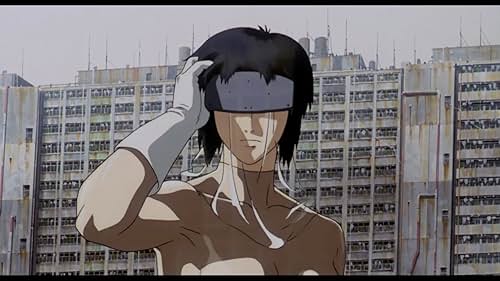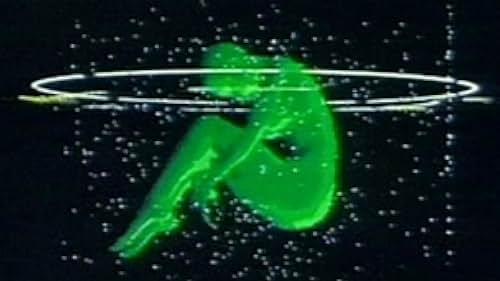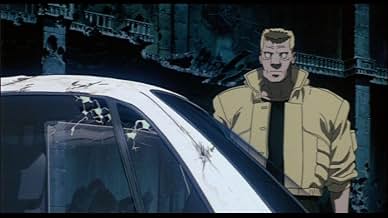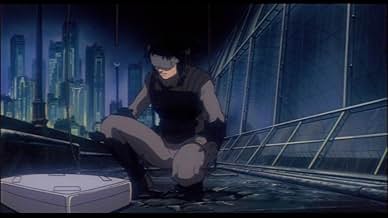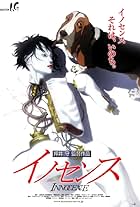Uma policial ciborgue e seu parceiro caçam um hacker misterioso e poderoso.Uma policial ciborgue e seu parceiro caçam um hacker misterioso e poderoso.Uma policial ciborgue e seu parceiro caçam um hacker misterioso e poderoso.
- Prêmios
- 5 vitórias e 7 indicações no total
Atsuko Tanaka
- Kusanagi Motoko
- (narração)
Iemasa Kayumi
- Ningyô tsukai
- (narração)
Akio Ôtsuka
- Batô
- (narração)
Kôichi Yamadera
- Togusa
- (narração)
Yutaka Nakano
- Ishikawa
- (narração)
Tesshô Genda
- Nakamura buchô
- (narração)
Namaki Masakazu
- Urisu hakase
- (narração)
Masato Yamanouchi
- Gaimu daijin
- (narração)
Shinji Ogawa
- Gaikôkan
- (narração)
Mitsuru Miyamoto
- Daida Mizuho
- (narração)
Kazuhiro Yamaji
- Seisô kyokuin
- (narração)
Shigeru Chiba
- Seisô kyokuin
- (narração)
Hiroshi Yanaka
- Kenshi-kan
- (narração)
Ginzô Matsuo
- Ossan
- (narração)
Takashi Matsuyama
- Jikkô-han
- (narração)
Sanryô Odaka
- Gishi
- (narração)
Masamichi Satô
- Untenshu
- (narração)
- Direção
- Roteiristas
- Elenco e equipe completos
- Produção, bilheteria e muito mais no IMDbPro
Enredo
Você sabia?
- CuriosidadesIn ordinary anime, characters would at least blink to create the feeling of "being animated", but in this movie, Motoko's eyes intentionally stayed unblinking many times. Director Mamoru Oshii's intention was to portray her as a "doll".
- Erros de gravaçãoThe car underneath the spider tank changes in size relative to the tank between shots.
- Citações
Major Motoko Kusanagi: If we all reacted the same way, we'd be predictable, and there's always more than one way to view a situation. What's true for the group is also true for the individual. It's simple: Overspecialize, and you breed in weakness. It's slow death.
- Cenas durante ou pós-créditosOn the Special Edition DVD of the film, the Manga Entertainment logo appears shaded cyberspace green and surrounded by circuitry.
- Versões alternativasThe original Japanese version has the song "Reincarnation" played over the ending credits. This song was replaced with "One Minute Warning" by Passengers (a collaboration between U2 and Brian Eno) for the English version.
- ConexõesEdited into Wamdue Project: King of my Castle (Roy Malone Remix) (1999)
- Trilhas sonorasSee You Everyday
Composed and Arranged by Kenji Kawai
Lyrics Pong Chack Man
Vocals Fang Ka Wing
Chorus Junko Hirotani
Avaliação em destaque
Ghost in the Shell is a masterpiece. I would go so far as to say that it's the second best science fiction film I've ever seen (behind 2001, of course), but no one knows about it. I find it terribly unfortunate that the only American viewers familiar with Ghost in the Shell are anime fans, many of whom overlook the film's complexity and see only its nudity and violence. The movie kind of gets in its own way-- within the first five minutes we see the heroine's nude body as well as a very messy head-exploding scene, and many of the viewers who would otherwise end up enthralled by the film's abundant style and intelligence immediately dismiss it as exploitative anime trash. Every time I show this movie to non-anime fans I have to explain beforehand that Ghost in the Shell is a serious work of science fiction and that everything in it, including the adult content, is part of the point the movie makes about where our society is headed.
The film is stylish, artistic, and beautiful. Masamune Shirow's stunningly believable vision of the future makes the jump from manga to anime remarkably well. As brilliant as the comics are, I really prefer the film version, which eliminates the nearly pornographic T&A (the film has nudity but it's clearly not meant to be titillating) and all of the exaggerated comic relief which only detracted from the manga in my opinion. The film's action sequences are strikingly different from the overly stylized symphonies of destruction seen in most action films. Gunfire, martial arts combat, and car chases are depicted exactly as they would occur in the real world-- without fast music or Armageddon-style hyper-editing or any of the needless cinematic baggage we've come to expect. But it's the movie's ideas that make it great, particularly in the last half hour, when thoughtful viewers learn what this story is all about-- the emergence of a new kind of life form, an intelligent and self-aware intelligence that can live indefinitely without ever inhabiting a physical body. The film argues that this will occur within the next thirty years, and the superbly ambiguous ending inspires us to come up with our own ideas of what will happen to humanity once this new life form begins to reproduce. This is filmmaking that should be seen and discussed.
And now the disclaimer. All of the above comments refer to the subtitled Japanese version of the film, NOT the English dub. Simply put, the dub ruins everything. A good example is Kusanagi's wry comment at the very beginning of the film. An officer who is communicating with Kusanagi through a kind of electronic telepathy tells her there's a lot of static in her brain. In the original Japanese version (as well as in the manga) she replies that "It's that time of the month," but in the dub her comment is inexplicably changed to "Must be a loose wire." It's completely insane-- do they think that, in a film with considerable nudity and graphic violence, people are going to be offended by a PMS innuendo? The whole movie is filled with such intelligence-insulting changes; please do yourself a favor and watch the subtitled version.
The film is stylish, artistic, and beautiful. Masamune Shirow's stunningly believable vision of the future makes the jump from manga to anime remarkably well. As brilliant as the comics are, I really prefer the film version, which eliminates the nearly pornographic T&A (the film has nudity but it's clearly not meant to be titillating) and all of the exaggerated comic relief which only detracted from the manga in my opinion. The film's action sequences are strikingly different from the overly stylized symphonies of destruction seen in most action films. Gunfire, martial arts combat, and car chases are depicted exactly as they would occur in the real world-- without fast music or Armageddon-style hyper-editing or any of the needless cinematic baggage we've come to expect. But it's the movie's ideas that make it great, particularly in the last half hour, when thoughtful viewers learn what this story is all about-- the emergence of a new kind of life form, an intelligent and self-aware intelligence that can live indefinitely without ever inhabiting a physical body. The film argues that this will occur within the next thirty years, and the superbly ambiguous ending inspires us to come up with our own ideas of what will happen to humanity once this new life form begins to reproduce. This is filmmaking that should be seen and discussed.
And now the disclaimer. All of the above comments refer to the subtitled Japanese version of the film, NOT the English dub. Simply put, the dub ruins everything. A good example is Kusanagi's wry comment at the very beginning of the film. An officer who is communicating with Kusanagi through a kind of electronic telepathy tells her there's a lot of static in her brain. In the original Japanese version (as well as in the manga) she replies that "It's that time of the month," but in the dub her comment is inexplicably changed to "Must be a loose wire." It's completely insane-- do they think that, in a film with considerable nudity and graphic violence, people are going to be offended by a PMS innuendo? The whole movie is filled with such intelligence-insulting changes; please do yourself a favor and watch the subtitled version.
- Speechless
- 11 de nov. de 2000
- Link permanente
Principais escolhas
Faça login para avaliar e ver a lista de recomendações personalizadas
Detalhes
Bilheteria
- Orçamento
- JP¥ 330.000.000 (estimativa)
- Faturamento bruto nos EUA e Canadá
- US$ 889.074
- Fim de semana de estreia nos EUA e Canadá
- US$ 2.736
- 4 de fev. de 1996
- Faturamento bruto mundial
- US$ 964.016
- Tempo de duração1 hora 23 minutos
- Cor
- Proporção
- 1.85 : 1
Contribua para esta página
Sugerir uma alteração ou adicionar conteúdo ausente

Principal brecha
What is the streaming release date of O Fantasma do Futuro (1995) in Australia?
Responda
